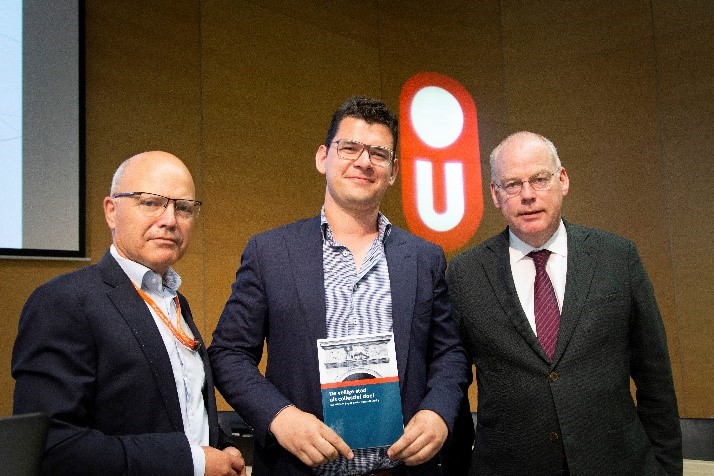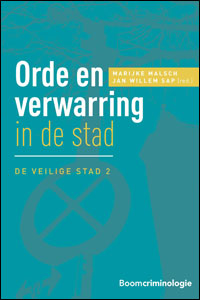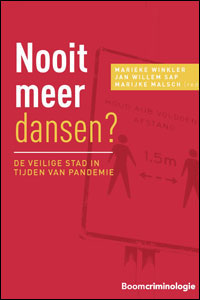Volume 1: The safe city as a collective goal (in Dutch)
Published: June 2019
Editors: Emile Kolthoff and Jan Willem Sap
Cities are struggling. They must cope with issues related to misconduct, crime, housing problems, illegal migration and radicalisation. Since the role of the national state is diminishing relative to international and European law, local interventions are becoming ever more important. Stay as close to citizens as possible – that is the aim. Terrorists want to attract attention, so a terrorist attack is likely to take place in the city. How can this be prevented? How to make cities safe?
From legal, criminological, historical and cultural perspectives, the book provides answers to today’s burning questions. How can government, social organisations and citizens take responsibility for safe cities in the future? The volume De veilige stad als collectief doel [The safe city as a collective goal] discusses themes such as subversion, neighbourhood prevention, terrorism, area bans and digital safety in the modern city. The authors emphasise that all citizens should contribute to the safety of a city and that the mayor should take the lead. All authors are associated with the Faculties of Humanities and Law at the Open Universiteit.
 The first copy was handed to Marco Peters, councillor of the city of Heerlen (CDA), who gave a speech on the challenges politicians face when striving to make the city safer. In the picture: Emile Kolthoff (left), Marco Peters and Jan Willem Sap (right).
The first copy was handed to Marco Peters, councillor of the city of Heerlen (CDA), who gave a speech on the challenges politicians face when striving to make the city safer. In the picture: Emile Kolthoff (left), Marco Peters and Jan Willem Sap (right).
Volume 2 : Order and confusion in the city (in Dutch)
Published in October 2020
Editors: Marijke Malsch and Jan Willem Sap
 Cities are in a state of confusion and are searching for some kind of order. Mayors and city councillors are being threatened. Increasing numbers of people with mental disorders are out on the streets. Municipalities are unsure how to handle prostitution: ban it, regulate it or move it on? City living sometimes leads to stress. More green areas in the cities might help to counteract this, yet the city must also retain space for sufficient housing.
Cities are in a state of confusion and are searching for some kind of order. Mayors and city councillors are being threatened. Increasing numbers of people with mental disorders are out on the streets. Municipalities are unsure how to handle prostitution: ban it, regulate it or move it on? City living sometimes leads to stress. More green areas in the cities might help to counteract this, yet the city must also retain space for sufficient housing.
The book Orde en Verwarring in de Stad (Order and confusion in the city) provides an overview of the problems and challenges facing cities in the 21st century. How to counteract the excesses of AirBnB? Do current ‘bed-bath-bread’ schemes for illegal immigrants meet European standards? If a mayor shuts down a building where drugs are being dealt, is it possible to impose other sanctions too? What about mosques being financed from abroad? Are honour killings in big cities the same as in the countryside? All these questions are addressed in the book 'Orde en verwarring in de stad'.
On 22 October, the volume was presented by Ronald Janse, Dean of Law at the Open Universiteit, to Lucas Bolsius, Mayor of Amersfoort. The book presentation was preceded by a symposium. A video of the symposium is available to view.
Volume 3: Never dance again? The city in times of a pandemic (in Dutch)
Published in October 2021
Editors: Marieke Winkler, Jan Willem Sap and Marijke Malsch
In the sp ring of 2020, social life comes to an abrupt standstill. The coronavirus is on a global upsurge and national and international communities are faced with a health crisis for which no scenarios exist. In order to reduce infections, coronavirus measures are being taken one after the other in rapid succession. There is scarcely time for reflection. The book ‘Nooit meer dansen? De stad in tijden van pandemie’ [Never dance again? The city in times of pandemic] is an attempt to better understand the impact of the coronavirus crisis on Dutch society. It focuses specifically on the social and legal aspects of the crisis.
ring of 2020, social life comes to an abrupt standstill. The coronavirus is on a global upsurge and national and international communities are faced with a health crisis for which no scenarios exist. In order to reduce infections, coronavirus measures are being taken one after the other in rapid succession. There is scarcely time for reflection. The book ‘Nooit meer dansen? De stad in tijden van pandemie’ [Never dance again? The city in times of pandemic] is an attempt to better understand the impact of the coronavirus crisis on Dutch society. It focuses specifically on the social and legal aspects of the crisis.
How does the pandemic affect the administration of justice? How does it affect public access to criminal trials? What does social distancing do to people who are already in an unsafe situation, perhaps due to domestic violence? The coronavirus pandemic has turned 'safety' into primarily a medical issue. The authors of this book show that other aspects of public and personal safety cannot be neglected if we want to improve our ability to manage future pandemics and learn to 'dance' with the virus.
On 15 October, the volume was presented by Thomas Vaessens, Dean faculty of Humanities at the Open Universiteit, to Diederik Gommers, intensivist at Erasmus MC and chair of the Dutch society of Intensive Care. The book presentation was preceded by a symposium. A video of the symposium is available to view.
Volume 4: Polarisation and cohesion in the city (in Dutch)
To be published: 2022
Editors: Emile Kolthoff, Janine Janssen
The Bl ack Face and Black Lives Matter movements put the spotlight on discrimination. Covid deniers and anti-vaxxers claim a leading role in the coronavirus debate. Populist parties add fuel to the fire. Trust in politics and politicians is waning and the Dutch tax authority is sinking further and further into the morass of the benefits scandal. The inhabitants of the Groningen region feel insufficiently protected against the earthquakes caused by gas extraction and they are fighting a bitter battle for financial compensation. Digital technologies are opening up a lot of possibilities, yet security seems to be less and less a purely technical problem. The emphasis should be more on prevention, according to many, but because of the way that administration is organised, government, law and science are still more focused on reaction. In the meantime, perhaps citizens simply want to be heard and reassured.
ack Face and Black Lives Matter movements put the spotlight on discrimination. Covid deniers and anti-vaxxers claim a leading role in the coronavirus debate. Populist parties add fuel to the fire. Trust in politics and politicians is waning and the Dutch tax authority is sinking further and further into the morass of the benefits scandal. The inhabitants of the Groningen region feel insufficiently protected against the earthquakes caused by gas extraction and they are fighting a bitter battle for financial compensation. Digital technologies are opening up a lot of possibilities, yet security seems to be less and less a purely technical problem. The emphasis should be more on prevention, according to many, but because of the way that administration is organised, government, law and science are still more focused on reaction. In the meantime, perhaps citizens simply want to be heard and reassured.
Research is being conducted to examine changing rules, policies, practices, feelings, perceptions and visions. When, why and to what extent is security a public issue? Who owns the problem, according to public opinion? What are the relevant (moral) causal relationships? What scientific knowledge and insights exist already and what can be further developed and made accessible? Such questions are addressed in Volume 4.
On 1 November, the volume will be presented by Ronald Janse, Dean of Law at the Open Universiteit, to Roel Wever, Mayor of Heerlen. The book presentation will be preceded by a symposium. Further information will follow as soon as possible.
